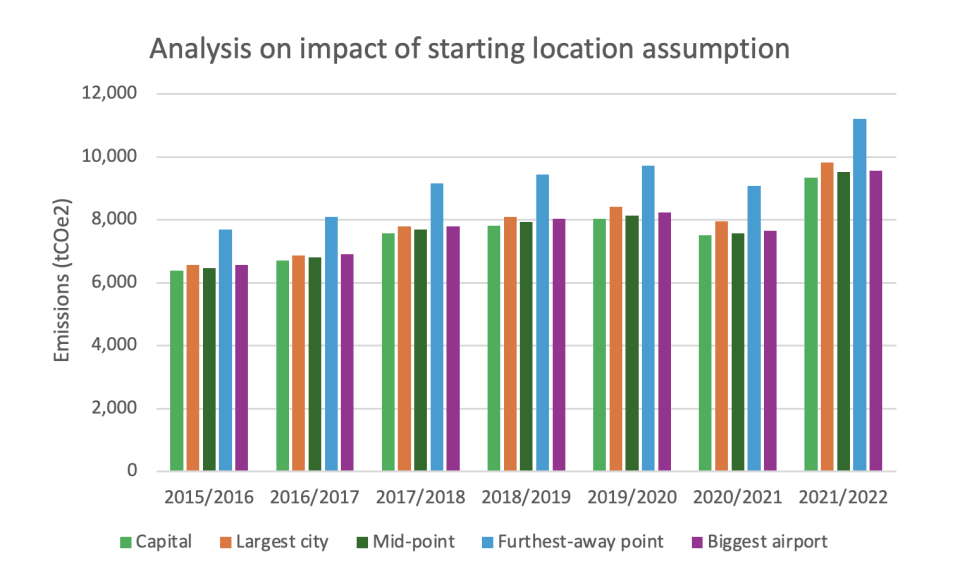
Measuring the environmental impact of student relocation

You may also like
Despite student relocation travel being a significant source of carbon emissions within higher education, the sector has lacked an agreed approach to calculating this contribution. This major gap in our reporting was highlighted during the development of our university’s net zero strategy, with no emissions data relating to students travelling to study in Aberdeen from around the world having been captured as part of previous reporting.
To overcome this data gap, Roederer Rose Lyne, the University of Aberdeen’s net zero and emissions manager, established a six-month undergraduate internship with one core objective: to develop a simple but robust calculation methodology and associated tool.
Initial research and development of a tool to measure carbon emissions
Intern Estrid Jonsson set about researching the problem by reviewing the availability of sector data and reporting standards, and undertaking extensive engagement with sector colleagues to understand if and how other institutions were capturing or reporting these emissions.
- Eight ways universities can reduce greenhouse gas emissions
- THE Awards 2024 spotlight: learn from the best in UK and Irish higher education
- Greening your university is not optional; it’s urgent
Although no consensus emerged, this highlighted some of the main barriers to calculating these emissions, notably developing a robust dataset that could cope with different or incomplete student domicile address data from across the world.
This first phase saw Estrid collaborate with colleagues in registry to establish a reliable and useable population dataset.
Establishing appropriate assumptions
Analysis showed that calculating at address level was complex but also rapidly led us to the conclusion that the data we held on a student’s “home” country was reliable.
The first assumption required was a proxy starting location that, when scaled up, provided a consistent estimate. Examples were tested to understand the impact of different assumptions on emissions calculations including:
- country capital
- furthest point from the UK
- closest point to the UK
- largest airport
- largest train station.

The resulting data (see Figure 1) formed the basis of further consultation and agreement that “capital city” represented the most balanced assumption.
Using the university’s biannual student travel survey and researching international flight routing patterns, travel mode assumptions were developed for each country (for example, flight only, combination of flight and rail, etc).
Finally, a review of feedback from sector colleagues and the Greenhouse Gas Protocol guidance established the core assumption that one return trip per student per year (at the start and end of the academic year) was attributable to university operations and should be included in institutional emissions monitoring.
The finalised tool was used in the first instance to calculate the university’s own student relocation emissions.
Developing the tool for the higher education sector
Almost immediately sector bodies began taking a keen interest in the tool, acknowledging the sector’s lack of a shared reporting methodology for these emissions. We were invited to present our findings at a showcase seminar, where the tool was demonstrated to an extended group of sector colleagues.
Following excellent sector feedback, the Alliance for Sustainability Leadership (EAUC) approached the university with a proposal to collaboratively develop the tool as a resource for the entire UK sector.
Embedding the tool as best practice methodology
The revised tool provided increased flexibility and customisation, enabling its use by any UK-based university or college. Its outputs were also aligned with sector reporting requirements such as the sector’s Standardised Carbon Emissions Reporting Framework guidance.
On completing this further development, Roederer worked with the EAUC to disseminate the tool to the sector, making it available through the EAUC’s Sustainability Exchange, and receiving support from the Scottish government to encourage its use as part of the annual statutory Public Bodies Climate Change Duty exercise in Scotland.
The tool has also been recognised by the Scottish Funding Council as a key enabler, supporting the requirement for robust data gathering on this major category of Scope 3 emissions.
Ongoing development and support
Having set out to develop a tool for internal use, the subsequent development and dissemination of the tool as a sector resource is consistent with the university’s 1495 foundational purpose that it is “open to all and dedicated to the pursuit of truth in the service of others” and applies it in the context of the modern-day delivery of net zero.
Our partnership with the EAUC has enabled the sharing of the tool as an open-source resource and is an ongoing collaboration. An updated version of the tool released in autumn 2024 includes several enhancements:
- GPS coordinates of country capitals and UK airports to improve the accuracy of distance data
- user adjustable custom travel assumptions for “local” students to compensate for overestimations
- country-level customisations for international flight paths
- latest UK government emissions factors.
The project is a positive endorsement of the living labs ethos that sees campus challenges serve as the basis for innovation. It also highlights that simple but robust calculation methodologies are possible, even for emissions sources derived from large, complex datasets.
Roederer Rose Lyne is net zero and emissions manager and Fraser Lovie is head of sustainability, both at the University of Aberdeen. The Student Relocation Travel Emissions Calculator was shortlisted in the Outstanding Contribution to Environmental Leadership category in the 2024 THE Awards. A full list of nominees can be found here.
If you would like advice and insight from academics and university staff delivered direct to your inbox each week, sign up for the Campus newsletter.


